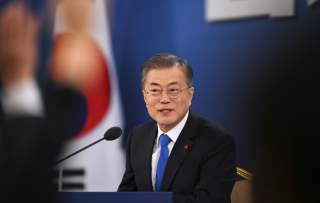The Hanoi Summit – We Asked Andrew Yeo What Happens Next in U.S.-North Korea Relations
"Unfortunately, the longer the two sides remain in a holding pattern, the more likely momentum for diplomatic engagement will fizzle."
Editor’s Note: Looking for more opinions on where we go after the Hanoi summit? Check out all 80 expert takes on where U.S-North Korea relations go next here.
The second summit between president Donald Trump and North Korean leader Kim Jong-un was a letdown for those anticipating progress on peace and denuclearization. Although some experts quip that “no deal is better than a bad deal,” the broader implications of the second summit are less clear for U.S.-North Korea relations. The direction of the relationship largely rests on whether the two sides remain committed to a stepwise process of negotiations.
In the near term, unless Kim (or for that matter Trump) radically decides to shift gears, U.S.-North Korea relations will likely remain in a holding pattern. Trump and Kim walked away from Hanoi with the understanding that working-level negotiations would continue. If both governments continue to work towards narrowing their differences by taking practical steps forward as outlined by U.S. envoy Stephen Biegun, we might see longer-term prospects for improved relations and a “new normal” between Pyongyang and Washington.
Unfortunately, the longer the two sides remain in a holding pattern, the more likely momentum for diplomatic engagement will fizzle. There is already evidence that North Korea rebuilt a rocket launch pad within a week after the Hanoi summit. Such actions are taken to signal North Korea’s resolve and maintain leverage on the negotiating front (not to mention retain some pride for its domestic audience after leaving Hanoi empty-handed). But they, unfortunately, provide ammunition for hardliners in Washington to avoid further diplomacy with the nuclear despot.
Without diplomatic follow-up, the recent thaw in U.S.-North Korea relations will refreeze, positions will harden, and Pyongyang will once again resort to brinksmanship. Beyond 2020, there is no guarantee Kim will find another partner as friendly as Trump to resume negotiations at the highest level. The bottom-line: working-level discussions must continue if we stand any chance of breaking from the past vicious cycle of U.S.-North Korean relations.
Andrew Yeo is an associate professor of politics and director of Asian Studies at The Catholic University of America in Washington, DC. His most recent and forthcoming books include North Korean Human Rights: Activists and Network (with Danielle Chubb), and Asia’s Regional Architecture: Alliances and Institutions in the Pacific Century.
Image: Reuters

